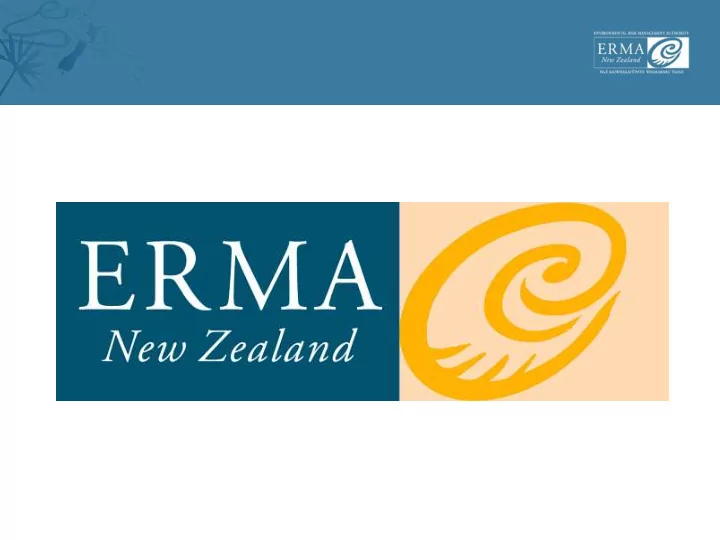

CHIEF EXECUTIVE INITIATED REASSESSMENT of METHYL BROMIDE 17-21 MAY 2010 Noel McCardle Senior Advisor Hazardous Substances ENVIRONMENTAL RISK MANAGEMENT AUTHORITY
The Process – Applicant - Chief Executive of ERMA New Zealand – Grounds established July 2008 – Preparation of application – ERMA staff – Public submissions 5 Nov 09 - 26 Feb 10 – 95 submissions received – Update Paper – Hearings – Consideration - Decision
The papers – The documentation – The application – Submissions & further information – Update paper
Key issues – International considerations – (Lack of) availability of alternatives – Public concern about the health effects – Effectiveness of controls – Weighing the positive v adverse effects
Key issues – International – EU Ban – The Montreal Protocol – Alternatives – Horticulture – Commodities – Logs – Health effects – Motor neurone disease
Key issues – International – EU Ban – The Montreal Protocol – Alternatives – Horticulture – Commodities – Logs – Health effects – Motor neurone disease
Controls – TELs (Tolerable Exposure Limits) – Buffer zones – Monitoring – Recapture
BUFFER ZONES
Buffer zones Use Minimum Buffer Zone (m) Ship’s hold (greater than 1000 kg methyl bromide 100 used) Ship’s hold (less than 1000 kg) 50 Logs/timber under covers outdoors and indoors 50 (without recapture technology) More than 1 shipping container (77 m 3 ) per hour 25 1 shipping container (77 m 3 ) per hour 10
Controls – Monitoring – Compliance with TELs – Effectiveness of controls – Exemptions – Reporting
Controls – Recapture – Practical? – Affordable?
Risk-based approach Weighing the risks, costs, & benefits: – Human health and safety – Environment – Relationship of Māori to the environment – Society and communities – Market economy – International obligations
Risk-based approach – Human health and safety – Exposure is involuntary – Risk will persist over time – Potential adverse effects are irreversible – Risk not understood by public – Uncertainty in best way to manage effects
Risk-based approach – Environment – Relationship of Māori to the environment – Society and communities – Market economy – International obligations
Methyl Bromide Key recommendations for additional controls: – Setting tolerable exposure limits – Minimum buffer zones – Requirements for air quality monitoring – Use of recapture technology for all shipping container fumigations – Requiring major fumigations to be notified – Restricted to use for quarantine and pre- shipment (QPS) purposes
Recommend
More recommend